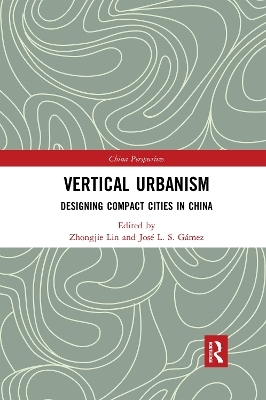
Vertical Urbanism
Routledge (Verlag)
978-0-367-59159-5 (ISBN)
Studies of compact cities have evolved along with the rising awareness of climate change and sustainable development. Relevant debates, however, reveal that the prevailing definitions and practices of compact cities are tied primarily to traditional Western urban forms.
This book reinterprets "compact city", and develops a ground-breaking discourse of "Vertical Urbanism", a concept that has never been critically articulated. It emphasizes "Vertical Urbanism" as a dynamic design strategy instead of a static form, distinguishing it from the stereotyped concept of "vertical city" or "towers in the park" dominant in China and elsewhere, and suggests its adaptability to different geographic and cultural contexts. Using Chinese cities as laboratories of investigation, this book explores the design, ecological, and sociocultural dimensions of building compact cities, and addresses important global urban issues through localized design solutions, such as the relationship between density and vitality, the integration of horizontal and vertical dimensions of design, and the ecological and social adaptability of combinatory mega-forms. In addition, through discussions with scholars from the United States, China, and Japan, this book provides an insight into the theoretical debates surrounding "compact city" and "Vertical Urbanism" in the global context.
Scholars and students in architecture and urban planning will be attracted by this book. Also, it will appeal to readers with an interest in urban development and Asian studies.
Zhongjie Lin is Director of the Master of Urban Design Program at the University of North Carolina at Charlotte and cofounder of Futurepolis, a cross-disciplinary design practice. A 2013 Guggenheim Fellow, he studies modern architectural avant-garde movements, theory and practice of urban design, and contemporary architecture and urbanism in East Asia, and has published extensively in these areas. José L.S. Gámez is an Associate Professor of Architecture and the Associate Director of the School of Architecture at the University of North Carolina at Charlotte. His research explores the role of community-engaged scholarship in public interest design, the roles of culture and identity in architecture and urbanism, and critical art and design practices.
List of figures List of tables List of contributors Preface
Part I: Framing the Discourse of Vertical Urbanism
1. Vertical Urbanism: Re-conceptualizing the Compact City
2. When New Urbanism Gets Old: Cultural Difference in Global City Design
3. Hong Kong’s Transit-Oriented Podium-Tower Development
4. City without Landmark: The Soft City for the Ageing Society
5. From Manhattan-ism to Bigness: Reconsidering an Alternative Urbanism of Rem Koolhaas
Part II: Urban Design and Transformation of Chinese Cities 6. The City after the City
7. Urban Regeneration and Public Space Making: Case Study of Urban Design for the North Bund in Shanghai
8. Urbanism in a Skyscraper: A Study of Vertical Malls in Hong Kong
9. Deterritorialization and the Collective Memories of Contemporary Shanghai
10. Restoring Hydrophilic Cities: Strategies of Urban Waterfront Space Classification and Design in Suzhou
11. Vertical Development and Urban Design: The Jiefangbei Experience
Part III: Compact City and Eco-city
12. Performance-based Model for Vertical Urbanism
13. Compact Development in Hong Kong
14. Spatial Metrics of Urban Form: Measuring Compact Cities in China
15. Eco-city Planning in China: A Review of Policies and Cases 2009–2015
16. Living off the Ground: Cautionary Tales from a Small Island
Part IV Expanding Pedagogical Territory
17. Experiencing the Compact City: A Pedagogy of Global Engagement
18. Suzhou Industrial Park High-speed Rail Station Business District
19. Redevelopment of Xiangmen Area in the Historic Center of Suzhou
20. Wuyuan Bay Waterfront Redevelopment in Xiamen
Index
| Erscheinungsdatum | 01.07.2020 |
|---|---|
| Reihe/Serie | China Perspectives |
| Verlagsort | London |
| Sprache | englisch |
| Maße | 156 x 234 mm |
| Gewicht | 500 g |
| Themenwelt | Naturwissenschaften ► Geowissenschaften ► Geografie / Kartografie |
| Technik ► Architektur | |
| ISBN-10 | 0-367-59159-6 / 0367591596 |
| ISBN-13 | 978-0-367-59159-5 / 9780367591595 |
| Zustand | Neuware |
| Informationen gemäß Produktsicherheitsverordnung (GPSR) | |
| Haben Sie eine Frage zum Produkt? |
aus dem Bereich


